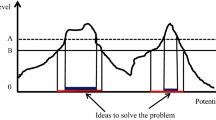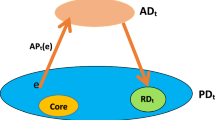Abstract
This paper proposes a new decision making/optimization paradigm, the decision making/optimization in changeable spaces (DM/OCS). The unique feature of DM/OCS is that it incorporates human psychology and its dynamics as part of the decision making process and allows the restructuring of the decision parameters. DM/OCS is based on Habitual Domain theory, the decision parameters, the concept of competence set, and the mental operators 7-8-9 principles of deep knowledge. The covering and discovering processes are formulated as DM/OCS problems. Some illustrative examples of challenging problems that cannot be solved by traditional decision making/optimization techniques are formulated as DM/OCS problems and solved. In addition, some directions of research related to innovation dynamics, management, artificial intelligence, artificial and e-economics, scientific discovery, and knowledge extraction are provided in the conclusion.




Similar content being viewed by others
References
Luce, R.D., Raiffa, H.: Games and Decisions: Introduction and Critical Survey. Wiley, New York (1957)
Dantzig, G.B.: Linear Programming and Extensions. Princeton University Press, Princeton (1998)
Bazaraa, M.S., Sherali, H.D., Shetty, C.M.: Nonlinear Programming: Theory and Algorithms. Wiley-Interscience, New York (2006)
Steuer, R.E.: Multiple Criteria Optimization: Theory, Computation and Application. Wiley, New York (1986)
Ehrgott, M., Gandibleux, X.: Multiple Criteria Optimization: State of the Art Annotated Bibliographic Surveys. Kluwer Academic, Dordrecht (2003)
Shapiro, A., Dentcheva, D., Ruszczyński, A.: Lectures on Stochastic Programming: Modeling and Theory. MPS/SIAM Series on Optimization, vol. 9. Society for Industrial and Applied Mathematics, Philadelphia (2009)
Slowinski, R., Teghem, J.: Stochastic Versus Fuzzy Approaches to Multiobjective Mathematical Programming Under Uncertainty. Kluwer Academic, Dordrecht (1990)
Bellman, R., Zadeh, L.A.: Decision-making in a fuzzy environment. Manag. Sci. 17(4), 141–164 (1970)
Zimmermann, H.J.: Fuzzy Set Theory and Its Application. Kluwer Academic, Dordrecht (2001)
Sakawa, M., Nishizaki, I., Katagiri, H.: Fuzzy Stochastic Multiobjective Programming. International Series in Operations Research and Management Sciences, vol. 159. Springer, Berlin (2011)
Yu, P.L., Larbani, M.: Two-person second-order games, Part 1: formulation and transition anatomy. J. Optim. Theory Appl. 141(3), 619–639 (2009)
Yu, P.L.: Habitual Domains and Forming Winning Strategies. NCTU Press, Hsinchu (2002)
Yu, P.L., Chen, Y.C.: Blinds, fuzziness and habitual domain tools in decision making with changeable spaces. Hum. Syst. Manag. 29(4), 231–242 (2010)
Yu, P.L.: Forming Winning Strategies, an Integrated Theory of Habitual Domains. Springer, New York (1990)
Yu, P.L.: Multiple Criteria Decision Making: Concepts, Techniques and Extensions. Plenum, New York (1985)
Yu, P.L.: Habitual Domains: Freeing Yourself from the Limits on Your Life. Highwater Editions, Kansas City (1995)
Yu, P.L., Chen, Y.C.: Dynamic multiple criteria decision making in changeable spaces: from habitual domains to innovation dynamics. Ann. Oper. Res. (2010). doi:10.1007/s10479-010-0750-x
Yu, P.L.: Habitual domains. Oper. Res. 39(6), 869–876 (1991)
Chan, S.J., Yu, P.L.: Stable habitual domains: existence and implications. J. Math. Anal. Appl. 110(2), 469–482 (1985)
Yu, P.L.: Understanding Behaviors and Forming Winning Strategies. School of Business, University of Kansas, Lawrence (1989)
Yu, P.L., Zhang, D.: Competence set analysis for effective decision making. Control Theory Adv. Technol. 5(4), 523–547 (1989)
Yu, P.L., Zhang, D.: A foundation for competence set analysis. Math. Soc. Sci. 20(3), 251–299 (1990)
Yu, P.L., Zhang, D.: A marginal analysis for competence set expansion. J. Optim. Theory Appl. 76(1), 87–109 (1993)
Osinga, S., Hofstede, G.J., Verwaart, T.: Emergent Results of Artificial Economics. Lecture Notes in Economics and Mathematical Systems. Springer, Berlin (2011)
Larbani, M., Yu, P.L.: Two-person second-order games, part II: restructuring operations to reach a win-win profile. J. Optim. Theory Appl. 141, 641–659 (2009)
Larbani, M., Yu, P.L.: n-Person second-order games: a paradigm shift in game theory. J. Optim. Theory Appl. 149(3), 447–473 (2011)
Shoham, Y.: An overview of agent-oriented programming. In: Bradshaw, J.M. (ed.) Software Agents, pp. 271–290. AAAI Press/MIT Press, Menlo Park (1997)
Serenko, A., Detlor, B.: Intelligent agents as innovations. Artif. Intell. Soc. 18, 364–381 (2004)
Russell, S., Norvig, P.: Artificial Intelligence: A Modern Approach. Prentice-Hall, Inc., Englewood Cliffs (1995)
Batten, D.F.: Discovering Artificial Economics, How Agents Learn and Economies Evolve. Westview Press, Boulder (1999)
LiCalzi, M., Milone, L., Pellizzari, P.: Progress in Artificial Economics. Lecture Notes in Mathematical Systems, vol. 645. Springer, Berlin (2010)
Wagman, M.: Scientific Discovery Process in Human and Computer, Theory and Research in Psychology and Artificial Intelligence. Praeger, Westport (2000)
Honavar, V.: Principles of artificial intelligence. Artificial Intelligence Research, Laboratory Center for Computational Intelligence, Learning, and Discovery, Department of Computer Science. Iowa State University (2006)
McGarry, K.: A survey of interestingness measures for knowledge discovery. Knowl. Eng. Rev. 20(1), 39–61 (2005)
Author information
Authors and Affiliations
Corresponding author
Appendix
Appendix
Rights and permissions
About this article
Cite this article
Larbani, M., Yu, P.L. Decision Making and Optimization in Changeable Spaces, a New Paradigm. J Optim Theory Appl 155, 727–761 (2012). https://doi.org/10.1007/s10957-012-0103-9
Received:
Accepted:
Published:
Issue Date:
DOI: https://doi.org/10.1007/s10957-012-0103-9




